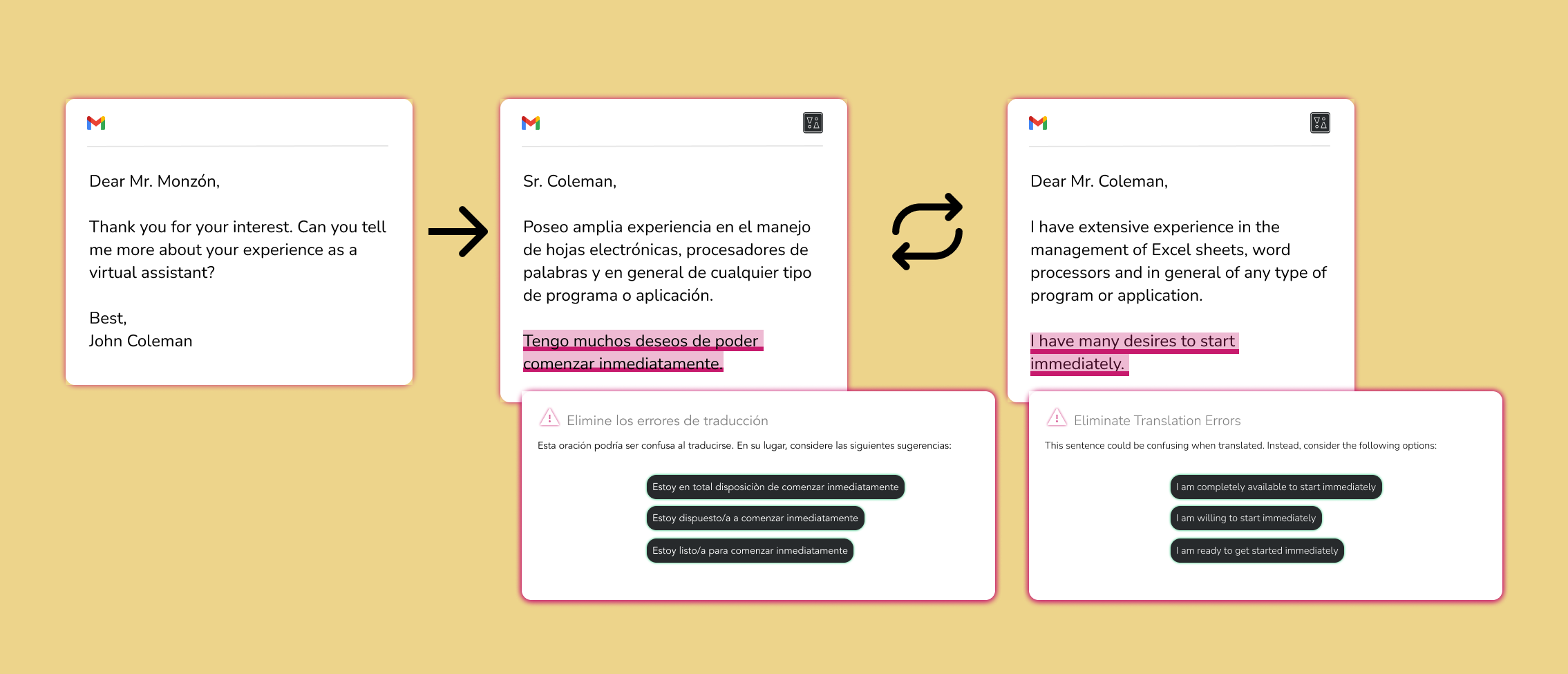
Backed with $4 million in funding, Viva's AI instant translation tool enables global work for Spanish-speaking talent from Latin America
PALO ALTO, CA / ACCESSWIRE / February 17, 2022 / During a time when the global talent shortage has been identified as a consequence of "the Great Resignation," employers are finding it difficult to fill critical positions. While many employers in the U.S. may be struggling to offer the level of salary, flexibility and benefits demanded by U.S. candidates, the market of remotely-available skilled talent in Latin America is substantial. What stands in the way is the language barrier. Viva Translate, an artificial intelligence software company with real-time translation of email and other interactive written communications, is rolling out a private beta designed to address this challenge. The company is also announcing $4 million in funding.
Founded by a team of Stanford researchers, Viva helps non-English speaking professionals discover, secure, and work at remote jobs. Viva Translate provides an automatic Spanish-English translation platform designed for work environments. Focused initially on the millions of Spanish-speaking professionals across Latin America, the solution is now accepting requests from prospective users to try out the technology.
Investors in the Viva seed round include General Catalyst, Chris Manning and Richard Socher from AIX Ventures, Fellows Fund, Hyphen Capital, and First Check Ventures as well as executives from Microsoft, Meta, Rappi, PayClip and more. The funds will be used to build out Viva's engineering and other internal teams.
"Viva Translate addresses a huge market opportunity for U.S. employers and the millions of incredibly skilled workers who may reside outside the country. The job market is now global and, with technology, language doesn't have to be a barrier for filling positions with qualified employees," said Belinda Mo, CEO and co-founder of Viva Translate. "Our tech delivers effortless communication across different languages, and it makes a huge amount of sense for U.S. employers to open themselves up to this large, untapped talent pool."
The talent shortage in 2021 reached 40 million workers worldwide and it is predicted to more than double by 2030. However, an estimated 80% of the world's workforce does not speak English. The new technology will address this scenario, making it possible to unlock millions of jobs previously not accessible for non-fluent English speakers.
"We are excited about Viva Translate's ability to enable new participants in the global economy," said Quentin Clark, managing director at General Catalyst. "Belinda and Tony have unique empathy for their users paired with a radically better approach to translation."

Unlike Google Translate and other similar translation tools, Viva Translate focuses on translating intent accurately for the context of freelancer-client communications. Starting as a Chrome browser extension, Viva's AI-powered natural language programming (NLP) translation product will automatically translate newly written Spanish communications into English as the user writes. The tool also detects grammatical and industry-specific improvements and clarifications that users can review.
Separately, the Viva Translate extension also provides recommendations for remote job openings that non-fluent English speakers can apply for, tailored to each user's skill set and résumé.
Emmanuel, a programmer in Venezuela, has been using Viva Translate's early beta to help him find gigs with English-speaking software development teams. He comments, "I have used it [Viva Translate] to communicate with the people I am working with at the moment, so when they send me the instructions of the job and how they want me to do it, we can make everything clear between us."
The company has already amassed a waitlist of more than 100,000 professionals from the IT/engineering, design, administrative, data entry and customer service industries eager to use the platform.
"With our new platform, Viva is introducing the future of remote work with unique cross-language teams," Mo said. "And with our funding, our own company is growing; we're actively looking for incredible teammates to join who are engineers, operators, and translation experts."
Media files, images here: link
About Viva Translate
Viva Translate is a cross-language translation tool that helps freelancers and remote teams around the world, allowing them to work for U.S. companies without English language fluency. The company is on a mission to create a world where people can live life without language barriers. Founded by Stanford graduates--both children of immigrants, who understand the difficulty of navigating a country as a non-native speaker--Viva is starting with Spanish-to-English and English-to-Spanish in-context, real-time written translations. The company has raised $4 million in funding and is based in Palo Alto, Calif. For more information, visit www.vivatranslate.com.
Media Contact:
Erica Zeidenberg
erica@hottomato.net
925-518-8159 mobile
SOURCE: Viva Translate
View source version on accesswire.com:
https://www.accesswire.com/689195/Viva-Translate-Introduces-AI-Context-Aware-Translation-Tech-to-Help-Non-English-Speaking-Professionals-Find-Jobs-in-the-US
